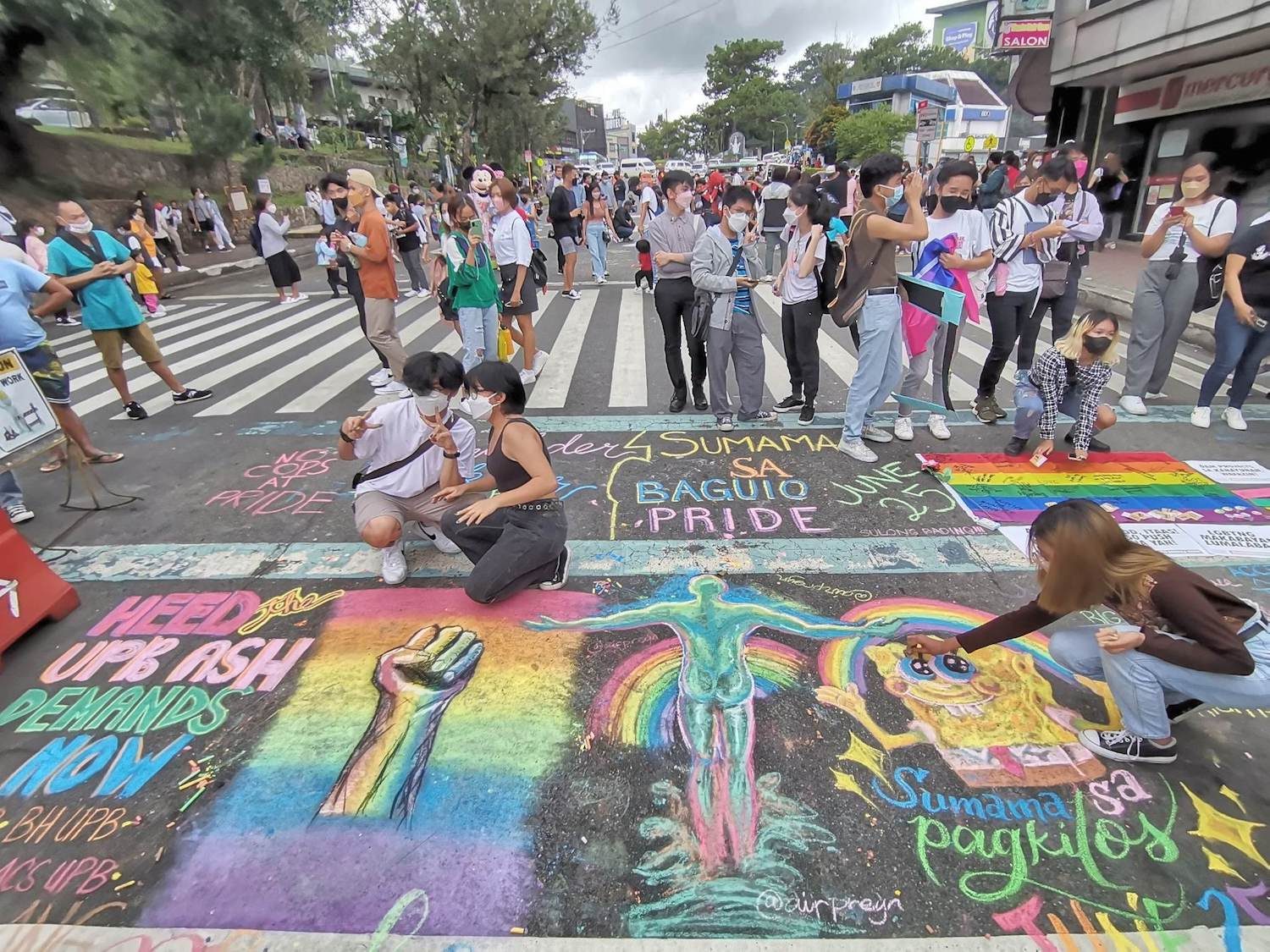SUMMARY
This is AI generated summarization, which may have errors. For context, always refer to the full article.

BAGUIO CITY, Philippines – Journalists and local artists are up in arms against Baguio City’s new policy prohibiting chalk art with political undertones at Session Road on Sundays, saying this infringes on freedom of expression.
In separate statements, the Kordilyera Media-Citizens Council (KMCC) and the local chapter of the National Union of Journalists of the Philippines (NUJP) called the restriction “censorship.”
“It is not only an outright attack against freedom of expression but an affront to a place that holds a title as the first member of the UNESCO Creative Cities Network in the Philippines,” KMCC said in a statement on Friday, May 12.
NUJP Baguio-Benguet reminded city officials that the Constitution guarantees freedom of expression and “ensures the right to hold opinions and ideas and share them without the state interfering.”
“We acknowledge the city government’s mandate to regulate activities and conduct during the Sunday closure of Session Road. However, officials should remember that regulation should not trample on fundamental human rights,” it said in a statement on Thursday, May 11.
“The policy, restricting political views, infringes on these rights, considered the heart of all freedoms. It is censorship, plain and simple,” the group added.
The Session Road Sunday Pedestrianization, which the city suspended after the Panagbenga because of some complaints from the buskers, resumed last May 7. The guidelines, released last week, include rules for busking, chalk art, and showcasing arts and crafts.
Citing the rules set for the chalk art, the city’s information office said: “Expression of political views and portrayals that negatively question or express opinions about social and political issues are not allowed. Graphic or literal suggestions and expressions of subversive acts or movements will not be tolerated.”
The guidelines also prohibit “images promoting corporate brands or institutions, and political affiliations” unless they are part of a thematic showcase permitted by authorities.
The City Tourism Office, which oversees the Sunday closure of Session Road, proposed the guidelines, which city executives adopted on April 25, during the management committee meeting.
‘Cultivates apathy’
KMCC said the policy also “cultivates apathy.”
“This arbitrary imposition not only limits creative ideas, but also denies the existence of social realism in the arts and its vital role in shaping public opinion and social discourse,” it said.
“It is a policy that cultivates apathy instead of concern, a regulation that puts artists and art enthusiasts in a vacuum, a place devoid of care,” the group added.
KMCC pointed out that denying politically relevant artworks would forestall the artistic growth of the artists participating in the chalk art.
In an online interview, multi-awarded writer and Dap-ayan ti Kultura ti Kordilyera vice chairperson Luchie Maranan said works of art are reflections of life and reality.
“There is social realist tradition in the arts precisely because art mirrors life and realities, and artists of Baguio are not excluded in these daily realities,” she said.
“Does the Tourism Council live in a vacuum? Or are they just parroting Imelda Marcos’ infamous dictum of painting/showing only the ‘true, the good, and the beautiful?’ Again from whose perspective is this censorship being pushed?” she added.
For sculptor Kigao Rosimo, limiting artists and individuals to non-political works on Session Road borders on paranoia.
“They are getting paranoid that merely expressing visually artist thoughts on issues regarding travails they see in our society would merit banning,” he said.
He also said that the rule runs counter to Baguio being a creative city. “Creativity stems not on aesthetics alone but motivated on things they see and observe.”
‘Practice tolerance’
KMCC urged city officials to observe “tolerance,” saying its members are applying the same attitude towards “bloggers who are almost extreme in their views” out of respect for their freedom of expression.
NUJP said officials should “abide by the Philippine Constitution and allow freedom of expression to guide their regulation.”
“We demand that Creative Baguio become a haven for art, culture, and heritage tempered by the balance a democratic nation offers,” the group said.
They also asked Mayor Benjamin Magalong and the city council to look into the matter.
In 2019, Magalong ordered Session Road’s closure every Sunday to encourage residents and tourists to walk and reduce pollution. The road’s closure also provided a venue for local business start-ups to promote their products and for individuals to showcase and improve their drawing skills. – Rappler.com
Add a comment
How does this make you feel?





There are no comments yet. Add your comment to start the conversation.